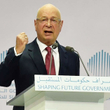Dubai: High information and communications technology (ICT) adoption, a powerful financial system that can support SMEs and strong policy stability makes the UAE top among countries that are making fast recovery from the impact of the COVID-19 pandemic, according to the World Economic Forum.
The WEF’s ‘The Global Competitiveness Report Special Edition 2020: How Countries are Performing on the Road to Recovery’ finds that the UAE is one of the countries that is relatively more resilient to the economic impact of the COVID-19 pandemic.
This year’s report is a special edition, where the forum has suspended its Global Competitiveness Index rankings due to extraordinary response measures taken by governments following the global pandemic outbreak and economic recession.
The WEF said the 2021 edition will see a return to benchmarking, providing a refreshed framework to guide future economic growth.
Road to recovery
This special edition examines how the recovery from the COVID-19 crisis can build productive, sustainable and inclusive economic systems.
This Report makes clear the priorities for making economies more productive, sustainable and inclusive as we emerge from the crisis. The stakes for transforming our economic systems simply could not be higher.
The report notes that countries with advanced digital economies, strong social safety nets and robust healthcare systems have managed the impact of the pandemic more effectively.
In the WEF’s global ranking of information and communications technology (ICT) adoption, the UAE has been ranked second in the world with a score of 92.3 after South Korea, ahead of the rest of the world. In the digital legal framework ranking too, the UAE is the fourth in the world with a score of 72.5.
Special edition of the WEF’s Global Competitiveness Report measures which countries are best prepared for recovery and future economic transformation.
“The World Economic Forum has long encouraged policymakers to broaden their focus beyond short-term growth to long-term prosperity. This Report makes clear the priorities for making economies more productive, sustainable and inclusive as we emerge from the crisis. The stakes for transforming our economic systems simply could not be higher,” said Klaus Schwab, Founder and Executive Chairman of the World Economic Forum.
UAE scores high in resilience
The report notes that countries with advanced digital economies and digital skills have been more successful at keeping their economies running while their citizens worked from home.
Countries with robust economic safety nets, such as Denmark, Finland, Norway, Austria, Luxembourg and Switzerland, were well placed to support those who could not work. Similarly, countries with strong financial systems such as Finland, the United States, the UAE and Singapore, could more easily provide credit to SMEs to prevent insolvency.
Countries that could successfully plan and integrate health, fiscal and social policies have been relatively more successful in mitigating the effects of the crisis, including Singapore, Switzerland, Luxembourg, Austria and the UAE.
Changes in business sentiment
In advanced economies, business leaders saw increased market concentration, a marked decline in competition for services, reduced collaboration between companies and fewer available skilled workers in the employment market as the shift to digitally enabled work accelerated. On the positive side, leaders saw greater government response to change, improved collaboration within companies and increased availability of venture capital.
In emerging markets and developing economies, business leaders noted an increase in business costs related to crime and violence, a reduction in judicial independence, a further reduction in competition and growing market dominance, and stagnating trust in politicians.
“During this time of profound uncertainty, the health crisis and economic downturn have forced a fundamental rethink of growth and its relationship to outcomes for people and planet. Policy-makers have a remarkable opportunity to seize this moment and shape new economic systems that are highly productive while growing shared prosperity and environmental sustainability,” said Saadia Zahidi, Managing Director, World Economic Forum.



